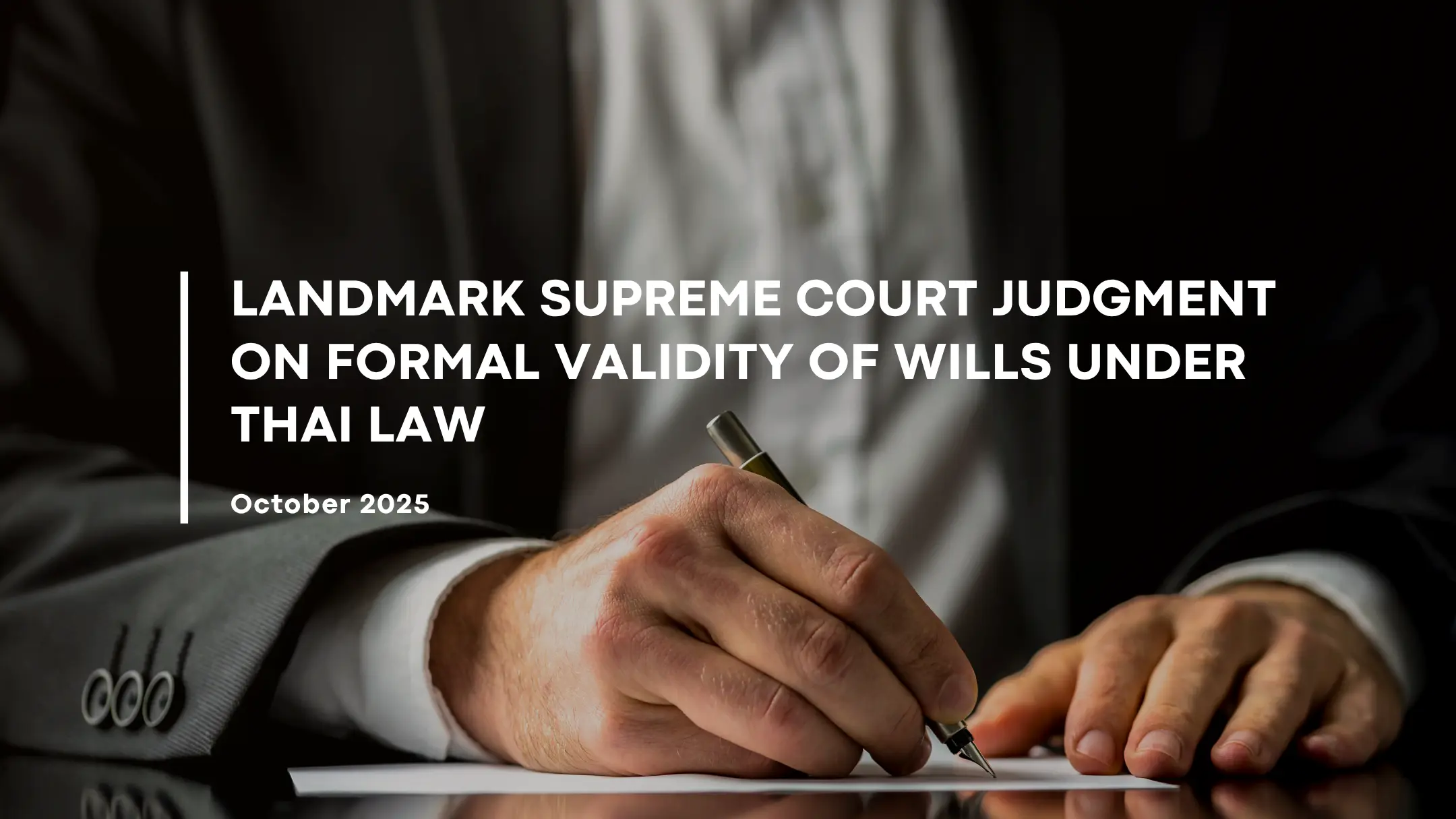A. Introduction
The organization and administration of a person’s estate after their death, legally known as the making of a “will,” is a matter of significant legal and personal importance. It is a process safeguarded by law, as it represents a person’s final intention in respect of their legacy and serves to prevent potential disputes that may arise in the future. In Thailand, the law prescribes specific legal requirements and formalities for making a valid will, whereby failure to comply with these requirements may render the will null and void, and the expressed intentions therein, even if clear as day, may not be fully enforceable.
B. Statutory Types of Wills Recognized by Thai Law
The types of wills are governed under Book V of the Thai Civil and Commercial Code, which deals with succession. This part of the law clearly prescribes the legally recognized forms of wills that are considered valid and enforceable. Upon examination of the relevant provisions, it can be concluded that Thai law classifies wills into seven distinct types as follows:
- The ordinary will (Simple Written Will)
- The holographic will (Will Written Entirely by the Testator)
- The public document will (Will Made Before a Public Officer)
- The secret document will (Sealed Will)
- The oral will (Will Made by Word of Mouth)
- The will made Abroad Section (Will that be governed and enforceable under foreign law or Thai law)
- The will Made in Time of War or During military Operations Section (Will made before Commissioned officers or hospital doctors)
Generally, the most common types of will are the ordinary will and holographic will which often raise legal issues that courts frequently must consider, namely, whether they meet the legal requirements and is valid under the law.
The ordinary will, which must be made in accordance with legal formalities must be in writing, include the date (day, month, year) of execution, and be signed by the testator (signature or fingerprint) in the presence of at least two witnesses at the same time. The witnesses must also sign the will.
The holographic will, which is also in writing but must be entirely handwritten by the testator. The testator must sign (signature only) and date the will, but no witnesses’ signatures are required.
A proper comparison of these two highlights the importance of executing a will in strict compliance with statutory requirements in the prescribed form is of utmost importance. In practice, however, there remain several common misconceptions and mistakes that individuals often make when drafting a will, which may ultimately affect its validity.
Previously, the Supreme Court had established the principle that a will made entirely by typewriting is not considered a holographic will under Section 1657 of the Civil and Commercial Code. Rather, it constitutes an ordinary will pursuant to Section 1656, which requires the presence of witnesses. Section 1656, paragraph one, stipulates that the testator must sign the will in the presence of at least two witnesses simultaneously. Therefore, when the witnesses to the contested will signed their names afterward, such action was contrary to the said provision. Consequently, the contested will is void under Section 1705.” (Supreme Court Judgment No. 2102/2551)
In a recent development, the Supreme Court issued an important decision in Judgment No. 4044/2567, which addresses critical open issues relating to the validity of wills. The ruling reflects the Court’s interpretative approach to relevant statutory provisions and provides further clarity on how the law views the legal sufficiency of a will.
C. New Supreme Court Judgment, Case No. 4044/2567
This case concerns a legal issue regarding the form of a holographic will, specifically whether the method by which the will was made complied fully with the legal requirements and whether it could be regarded as the testator’s final expression of intent concerning the disposition of their property upon death.
In this case, the deceased did not write the entire will in their own handwriting. Rather, the will contained both typed and handwritten portions. The essential content of this will can be summarized from the substance of the Supreme Court’s judgment as follows:
“Although the document contains some printed text, such as the heading “Will Document” and blank spaces for the testator to fill in details like place, date, name, address, and intentions regarding the management of assets, it appears from the document that the deceased personally wrote all these details by hand. At the end, there is printed text stating that the deceased has read and understood the entire content, considered it to reflect his true intention, and voluntarily wrote the handwritten portions without coercion, while being fully mentally competent.
The deceased made four identical copies of this will and signed in the sections marked “testator” and “printer/writer.” Therefore, this constitutes a full expression of the testator’s intention to make the will by himself in accordance with Civil and Commercial Code Section 1657.”
The Supreme Court issued a ruling concerning the handwritten as per Section 1657, which provides:
“A will may be made by a holograph document, that is to say the testator must write with his own hand the whole text of the document, the date and his signature.
No erasure, addition or other alteration in such will is valid unless made by the testator’s own hand and signed by him.
The provision of Section 9 of this Code shall not apply to a will made under this section.”
Key Points of This Supreme Court Judgment
The Court did not interpret the statute strictly by its literal wording. Instead, it considered that if all the printed parts are removed, the remaining handwritten content clearly constitutes a will. This will is valid under the law and not void because it sufficiently shows the testator’s intention, including essential elements such as the date, signature, and list of inheritance assets, along with confirmation that the testator was mentally competent at the time of execution.
Therefore, it can be seen that while making a will may seem simple, in reality it is a highly delicate matter. If a will is not made in accordance with the formal requirements prescribed by law, the testator’s final intentions may not be legally enforceable, and the will may become void immediately.
This Supreme Court judgment thus serves as an important precedent in the Court’s interpretation concerning the formalities of wills. It clearly illustrates a more flexible interpretative approach and provides significant guidance for future cases involving the validity and form of wills.
© PDLegal Thailand
This article is intended to provide general information only and does not constitute legal advice. It should not be used as a substitute for professional legal consultation. We recommend seeking legal advice before making any decisions based on the information available in this article. PDLegal fully disclaims responsibility for any loss or damage which may result from relying on this article.
Further information
If you have any questions regarding wills or how this legal development may impact your estate planning, please get in touch with the following persons:

